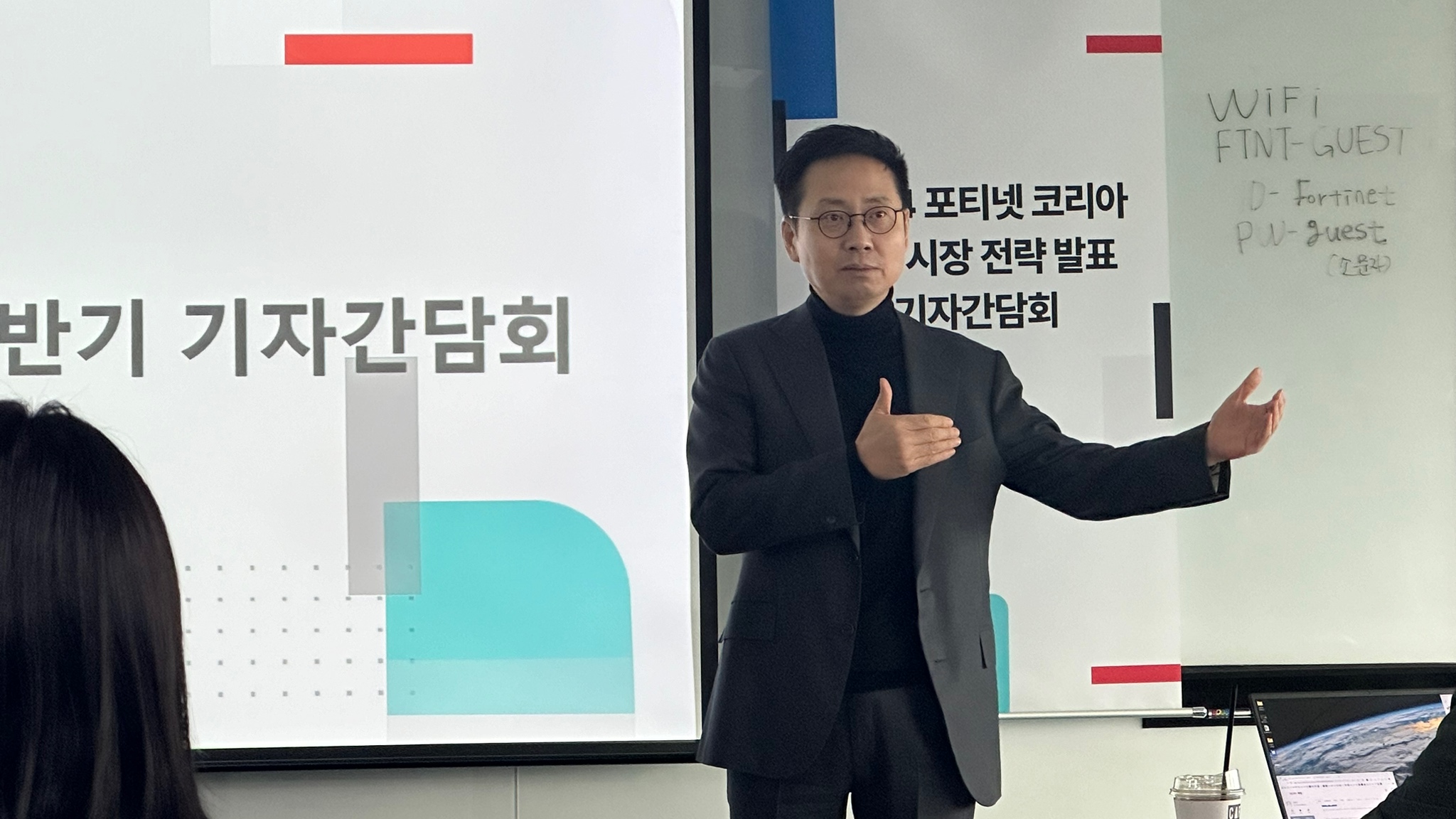날이 갈수록 정교해지는 사이버 보안 위협을 신속하게 해결하기 위해 자동화가 주요 전략으로 꼽히는 가운데, 글로벌 사이버 보안 기업 포티넷 코리아는 올해 시큐어 네트워킹·SASE·보안운영(SecOps)을 주력으로 국내 투자를 본격 확대한다.
시큐어 네트워킹·SASE·보안운영 3대 분야 주력
올해 전년比 20% 성장 목표...파트너십 확대·공공 수요 진입
AI 보안 운영 솔루션, 위협 해결 시간 10분으로 단축
날이 갈수록 정교해지는 사이버 보안 위협을 신속하게 해결하기 위해 자동화가 주요 전략으로 꼽히는 가운데, 글로벌 사이버 보안 기업 포티넷 코리아는 올해 시큐어 네트워킹·SASE·보안운영(SecOps)을 주력으로 국내 투자를 본격 확대한다.
포티넷 코리아는 6일 삼성동에서 기자 간담회를 열고 2024년 국내 네트워크 보안 시장을 적극 공략하기 위한 전략을 발표했다.
포티넷 코리아 조원균 지사장은 "작년 매출 성과는 약 14%의 성장을 보였고, 포티넷은 방화벽 시장에서 긍정적 평가를 받고 있다. 올해는 파트너를 250개사로 확장하고, 인력 투자도 25%로 확대해 전년 대비 20%의 사업 성장 목표를 가지고 있다"고 밝혔다.
또한 "포티넷은 지난 20년 동안 네트워킹과 보안을 융합하고 여러 제품을 단일 플랫폼으로 통합해왔다. 100건 이상의 해결 사례를 기반으로, 50개 이상의 엔터프라이즈 사이버 보안 제품을 보유하고 있다"며, "올해는 SASE 및 SOAR를 중심으로 하는 보안 관제(SecOps) 시장을 적극 공략하고 지방 조직 구축 등 산업별 지역별 고객을 넓혀가겠다"고 말했다.
포티넷은 시큐어 네트워킹(68%), SASE(21%), 보안운영(11%)을 3대 핵심 전략 솔루션으로 신규 시장 공략을 강화하고, 공공 시장 진입 및 MSSP 사업 모델 확대를 위한 정책을 마련할 계획이다. 또한 주요 파트너사들과 SaaS(Security as a service) 모델을 개발해 통신사를 비롯한 국내 기업들에게 최적의 보안 방안을 제시하고, 산업별 주요 기업에 대한 커버리지를 강화, 확대한다는 방침이다.
포티넷은 지난해 '포티게이트 3200F)', '포티게이트 900G', '포티게이트 90G', 및 '포티스위치 600', '포티스위치 2000' 등을 출시해 보안 패브릭 플랫폼을 강화하고 있다. 또한 KT, 구글 클라우드, 디지털 리얼티 등 국내외 기업들과 파트너십을 체결한 바 있다.
■ 국내 가장 큰 보안 위협...'피싱', '랜섬웨어'
포티넷은 IDC에 의뢰해 조사한 한국의 보안 관제(SecOps) 현황을 발표해 아태지역 설문을 바탕으로 현재 보안 운영에 대한 인사이트를 제시했다.
아태지역 550명, 한국 50명의 보안 전문가를 대상으로 한 설문에서, 기업의 50% 이상이 국내 가장 많이 발생하는 사이버 보안 위협으로 '피싱'과 '랜섬웨어'를 꼽았다. 또한 패치 취약성, 신원 도용, 공급망 위협이 그 뒤를 이었다. 아태지역의 중요 보안 이슈는 일부 차이를 보이지만 상위 요소는 비슷했다.
특히 작년 대비 62%의 조직에서 랜섬웨어 침해사고가 최소 2배 이상 증가한 것으로 나타났다. 코로나 팬데믹 후 54% 이상 응답자가 원격 근무로 내부자 위협이 늘었다고 답했다.
또한 기업의 약 44%가 현재 보안 위협에 대해 적시 대처 등 현재 도구가 부족함을 인지하고 있으며, 약 70%의 기업들이 이에 대응하기 위해 자동화를 통한 신속한 위협 탐지를 우선순위로 꼽았다.
약 78%의 기업들은 보안 운영에 자동화 및 오케스트레이션 도구를 도입하고 있다. 특히 응답자의 약 95%는 자동화를 통해 인시던트 탐지 시간이 25% 이상 개선되는 등 생산성 향상을 경험했다고 답했다.
자동화의 달성은 IT와 OT의 통합하는 보안 운영 솔루션으로 인텔리전스 최적화 및 자동화된 대응을 지원한다는 의미다.
포티넷은 지능화된 AI 기반의 보안 운영 솔루션을 지원해 자동화 요구사항을 해결하고, 인시던트 탐지 및 대응 전략을 제시한다. 포티넷 박종석 상무는 "포티넷은 10년간의 AI/ML 노하우를 통해 식별, 보호, 탐지, 대응, 복원의 과정에서 AI 기반 보안 관제 솔루션으로 위협을 탐지하고 대응 시간을 단축한다"고 말했다.
주요 솔루션으로 포티넷은 'SOAR(보안 오케스트레이션, 자동화 및 대응)'를 제시한다. SOAR는 이기종의 장비를 조직 내 표준화된 프로세스를 기반으로 커넥터로 상호 연동함으로써 하나의 통합된 플랫폼 제공해 사이버 보안 대응을 간소화 한다. 이를 통해 인시던트를 탐지하는 데 소요 시간을 21일에서 최대 1시간 미만으로 줄이고, 조사 및 해결 시간도 18.5시간에서 10분으로 단축할 수 있다.
최근 포티넷이 출시한 '어드바이저(Advisor)'는 보안 관제에 생성형 AI가 적용됐다. 상황 인식 GenAI 어시스턴트가 중요한 SOC 활동을 간소화 및 자동화 한다. 이는 포티넷의 SIEM 및 SOAR에 적용됐으며 향후 적용 범위가 늘어날 계획이다.
